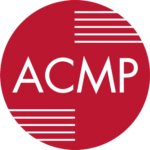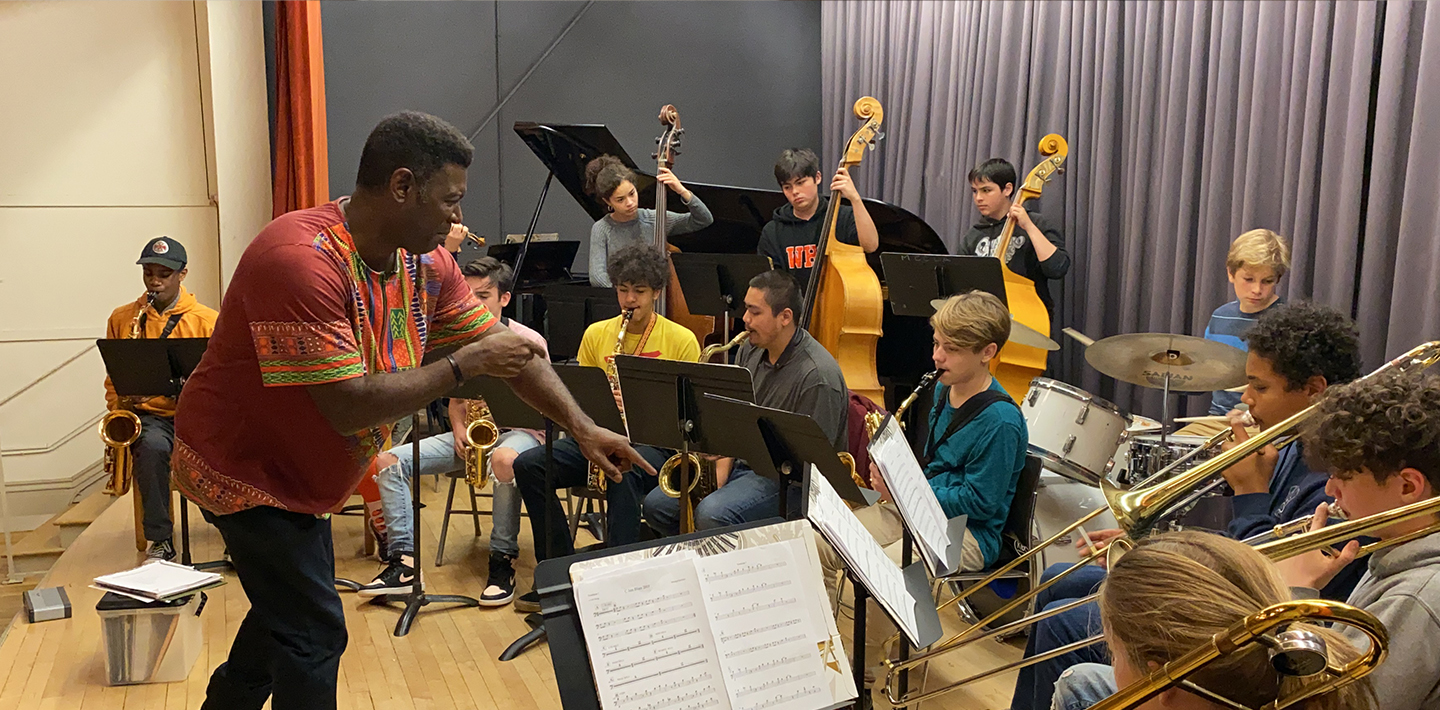CMC is known nationwide for creating tuition-free music programs that address critical community needs.
Children's Chorus
Children’s Chorus
Children discover their voices and learn to sing with a group in the Children’s Chorus. Students are introduced to musical skills to become careful listeners, better singers, and build confidence in an environment that emphasizes cooperation, teamwork and fun. With a patient and supportive approach to learning music, children are encouraged to express themselves and develop a lifelong love of singing.
No experience is required to sing in this free chorus.
Ages: 8–12
Instruments: Voices of all ranges
Musical Styles: Popular, jazz, multicultural folk, show tunes, originals
Prerequisites: A strong desire to sing and families committed to supporting their children’s experience.
Class size: 5–30 students
Location, Days and Times: Mission District Branch; Mondays and Wednesdays, 4:15–5:30pm. Class does not meet during summer.
Instructors: Beth Wilmurt
Tuition: Tuition-free. Only a $15 quarterly registration fee.
Class does not meet in Summer Quarter. Please check back in Fall for enrollment!
Intro to Musical Theater
Intro to Musical Theater
This exciting program offers young students a chance to explore improvisation, singing and acting together in a fun, supportive environment. Community Music Center is proud to partner with Pacific Singers & Actors Workshop to offer this class. Anyone with curiosity and a willingness to try something new is welcome. Actors, vocalists and instrumentalists and those excited by musical theater are welcome!
Ages: 11–14
Instruments: Voice. Instrumentalists are welcomed to bring their instruments.
Musical Styles: Musical theater
Prerequisites: No experience necessary—only curiosity and a willingness to try something new.
Class size: 6–12 students
Location, Days and Times: Mission District Branch; Mondays, 5:30–6:30pm. Class does not meet during summer.
Instructors: Ruby Day and Curt Branom
Tuition: No tuition or fees.
Class does not meet in Summer Quarter. Please check back in Fall for enrollment!
New Voices Bay Area TIGQ Chorus
New Voices Bay Area TIGQ Chorus
New Voices Bay Area TIGQ Chorus is a mixed-voice choral ensemble for singers who self-identify as transgender, intersex, or gender-queer (TIGQ).
Our goal is to build a creative, empowered, joyful space for our TIGQ community, to encourage voices that have been silenced or shamed to grow and be heard, and to change how the world thinks about gender identity and music. Made up of singers from beginners to professionals, the chorus learns and performs great music of many styles and traditions, builds strong connections, and lifts up our community’s strength and struggle through choral singing. NVBA debuted in 2018 at SF Trans Day of Remembrance, and has since sung at the Fresh Meat Festival, the National AIDS Memorial, Grace Cathedral and the Billboard Music Awards. Featured on NPR and in the SF Chronicle, the chorus continues to welcome new TIGQ singers, without audition. Join us!
The Chorus Director is Spanish/English bilingual.
Ages: 16 and up
Instruments: Voices of all ranges
Musical Styles: A wide range of choral repertoire, per the interests and abilities of the participants, the vision of the director, and available opportunities for performance.
Prerequisites: No prior experience necessary.
Class size: 10–50 singers
Location, Days and Times: Mission District Branch; Sundays, 5:30–6:30pm. Class does not meet during summer.
Instructors: Reuben Zellman and Jessalynn Levine
Tuition: No tuition or fees.
Class does not meet in Summer Quarter. Please check back in Fall for enrollment!
Neighborhood Choir Program for Older Adults and Adults with Disabilities
Songs & Stories Intergenerational Choir
Songs & Stories Intergenerational Choir
An Intergenerational Class of Storytelling and Singing
The most lasting songs from all genres of music tell stories that speak to us. We seek out stories that connect to our own, and help us connect to others. In this intergenerational performance-oriented class, we will explore storytelling through songs, learning the practical nuts and bolts of singing along the way. We will begin with classic folk, jazz, musical theater, and pop songs that convey clear stories. Next we will look at classic stories and choose existing songs to pair with them. Finally, we will think about our own life stories and find songs that connect to our personal experiences. The class will culminate in a sharing with invited friends and family of songs we’ve learned.
Ages: Youth ages 8–12, older adults ages 60 & up
Class Size: 12 youth, 12 older adults
Instruments: Voice
Musical Styles: Diverse styles of music
Prerequisites: Openness to working with people from other generations, interest in storytelling and singing and working collaboratively in a group. Older adults must be residents of San Francisco. Because enrollment is limited, older adults already enrolled in a different CMC intergenerational program will not be considered for this class.
Instructor: Beth Wilmurt
Location, Day, Time: Mission District Branch, Fridays, 3:30–5:30pm
Layered Start Times
- 3:30pm – Older Adults Pre-session
- 4:00pm – Youth and Older adults combined session
Tuition: This class is completely tuition-free
Class does not meet in Summer Quarter. Please check back in Fall for enrollment!
Teen Jazz Orchestra
Teen Jazz Orchestra
Teen Jazz Orchestra is an ensemble dedicated to performing the music of Duke Ellington, Billy Strayhorn, Count Basie, various other composers, and original compositions. The orchestra is led by composer, bassist, and teacher Marcus Shelby. Each class will include a discussion about the history of the music, development of the blues, theory, listening sessions, video, learning about key characters, and imagining the possibilities of the music.
Ages: Teens 13–18
Instruments: Instrumentation includes (but is not limited to) alto sax, tenor sax, clarinet, baritone sax, trombone, trumpet, piano, bass, drums, guitar, violin, and vocals.
Musical Styles: Jazz, rhythm and blues, funk, Latin jazz
Prerequisites: Strong interest, proficiency on an instrument, basic music reading skills, or instructor’s consent.
Class size: 15–20 students
Location, Days and Times: Mission District Branch; Tuesdays, 4:15–6:15pm. Class does not meet during summer.
Instructors: Marcus Shelby
Tuition: No tuition or fees.
Class does not meet in Summer Quarter. Please check back in Fall for enrollment!
YOUNG MUSICIANS PROGRAMS
CMC’s Young Musicians Program, a partnership with the San Francisco Unified School District, brings the many benefits of music—artistic, educational, personal, and social—to middle and high school students. Since 1987, this tuition-free, award-winning program embraces diversity, and offers a comprehensive, culturally diverse curriculum. Group classes explore theory, musicianship, and composition. Ensemble classes may play Latin, classical, jazz and other music forms in orchestra, chamber groups, combos and bands.
Students who are nominated by their public school teacher audition each Spring for the following academic year. If accepted, students are eligible for a full scholarship that provides students with weekly free private instrumental lessons, theory, musicianship and ensemble classes for the academic year. The YMP program focuses on serving middle and high school students from low-income San Francisco households.
Students who are nominated by CMC private lesson teachers are eligible for a scholarship for group theory/musicianship and ensemble classes for the academic year.
Mission District Young Musicians Program (MDYMP)
The tuition-free Mission District Young Musicians Program (MDYMP) offers a comprehensive music education with a focus on Latin music. It primarily serves Latino youth from the Mission District who are nominated by their public school music teachers, CMC teachers, and community organizations. The curriculum focuses on music of Latin America and is taught by bilingual (Spanish/English) instructors. Group classes take place at the Mission Cultural Center for Latino Arts each Saturday and private lessons can take place at either CMC branch. Students perform in December and June, and will have additional performance opportunities off-site. Classes do not meet during summer.
Ages: 12-18
Instruments: All and voice
Musical Styles: Latin (traditional and popular)
Prerequisites: Minimum two years playing an instrument or singing. Students nominated by their public school teacher must remain in their school music programs during the program to qualify. Students nominated by their CMC teacher must stay in their private lessons at CMC to qualify. Admission is based on both need and merit.
Class size: 25 students working in smaller groups
Location, Days and Times:
Private lessons: CMC’s Mission or Richmond District Branch
Group class: Mission District Branch, Saturdays from 10:00am-12:00pm
Instructors: Chantel Hernandez (Coordinator), Eva (“Nena”) Aldaz, Miguel Govea, Charlie Gurke, Erick Peralta, Tregar Otton, Juan Ceballos
Tuition: No tuition or registration fee (scholarship program)
How to apply: Admission is by recommendation from the student’s school music teacher, CMC private lesson teacher, or community organization, plus an audition during the spring. For more information or to make a nomination, contact Program Director Sylvia Sherman at ssherman@sfcmc.org.
Class does not meet during summer.
Young Musicians Program
Ages: 12-18
Instruments: All
Musical Styles: Classical, jazz, popular, music theory, composition, musicianship
Prerequisites: Minimum of two years playing an instrument. Must be nominated to audition. Students nominated by their public school teacher must remain in their school music programs during the program to qualify. Students nominated by their CMC teacher must stay in their private lessons at CMC to qualify. Admission is based on both student merit and instruments needed for ensembles. Classes do not meet during summer.
Class size: Small chamber ensembles to chamber orchestra, 4–15 students per ensemble
Locations, Days and Times:
Private lessons: Mission District Branch or Richmond District Branch scheduled with registrars
Group classes: CMC’s Mission District Branch, Saturdays
Middle School Level: 12:00–2:00pm
High School Level: 10:00am–12:00pm (with some classes starting at 9:00am)
Instructors: Leo Baluk, Christian Bonvin, Scott Foster, David Steinberg, Katrina Wreede (Coordinator), Angie Zheng, Michael Long
Tuition: Full-tuition scholarship or CMC private lesson fees only.
How to Apply: Admission is by recommendation from the student’s school music teacher, community organization, or CMC private teacher plus audition during the spring or early fall. Early auditions are recommended. For more information or to make a nomination, contact Program Director Sylvia Sherman at ssherman@sfcmc.org.
This class does not run during summer.
 This program was made possible, in part, through the support of Associated Chamber Music Players (ACMP), an international service organization supporting chamber music for pleasure. Join ACMP – Membership is free!
This program was made possible, in part, through the support of Associated Chamber Music Players (ACMP), an international service organization supporting chamber music for pleasure. Join ACMP – Membership is free!


